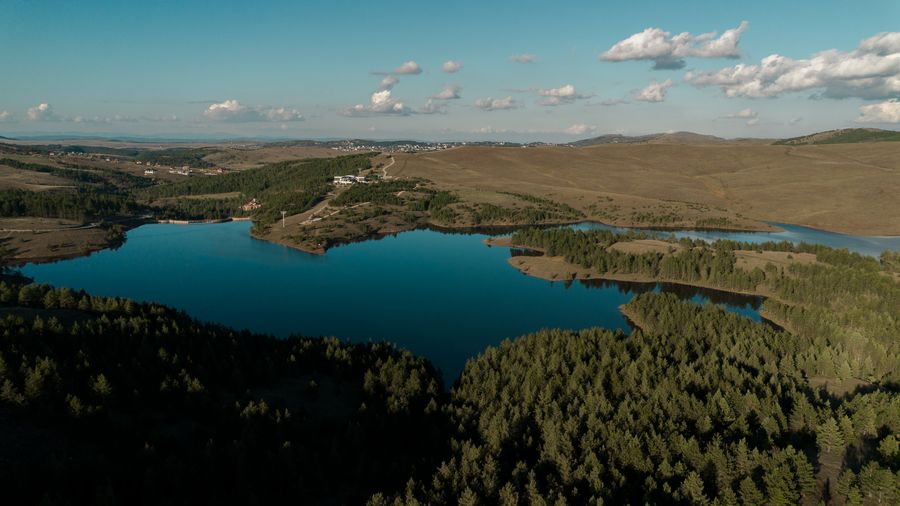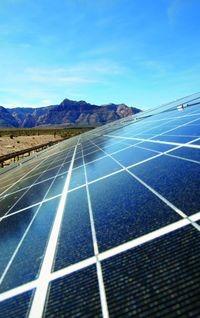Dubai’s Alcazar Energy Partners is betting heavily on the Western Balkans, following in Masdar’s footsteps and charting its own path. By Cristiana Sandeva
The Western Balkans may not yet be an obvious choice for a family holiday, but it is certainly a landing ground for big investments by big energy players, among them Abu Dhabi’s Masdar and Israeli companies Enlight, Econergy and Nofar.
Dubai-based Alcazar Energy Partners’ rising star is starting to shine its slight but steady light on the region and its experienced leadership has a clear plan of action to grow bright.
Co-founder and CEO Daniel Calderon came a long way from his native Colombia to co-found Alcazar Energy Partners in Dubai 10 years ago. Previously working for General Electric across several global locations, he arrived in the UAE in 2009 to lead Masdar’s origination and investment management team in Abu Dhabi. He co-founded Alcazar in 2014 as CEO alongside ex-Mubadala Markus von Haniel as managing director and head of investment and project finance, and Adriana Guerrero as chief affairs officer.
The company’s inaugural US$240m fund was fully invested alongside debt financing in a renewables portfolio across the Middle East & North Africa and subsequently sold to China Three Gorges in 2021 for US$500m. The first vehicle mobilised US$711m of foreign direct investments across the Middle East and North Africa region, including in Jordan and Egypt.
With a new, second US$500m fund closed in 2024, Alcazar now has the funds to focus on Serbia, Montenegro and North Macedonia, as well as looking to step into Turkey soon. It aims to mobilise up to US$2bn in foreign direct investment through its latest fund.
“Alcazar sees an excellent investment opportunity in the Western Balkans as it is still an underserved region when it comes to renewables generation but there is strong appetite from both local and international project finance institutions,” Calderon told PFI.
The company is targeting a 1.6GW wind generation pipeline across four countries, Calderon confirmed.
Its most advanced project in the region is the 119MW Bijela wind farm in Montenegro. The 120MW Stip 1 and 280MW Stip 2 wind projects in North Macedonia are at early development stage, as is the 200MW Celzijus wind scheme in Serbia. The company is targeting to increase its Serbian pipeline further and to acquire the early-stage 194MW Yeniciftlik wind scheme in Turkey by the end of the year.
Detailed projects
“The EBRD is mandated to structure the non-recourse project financing for our Bijela wind farm in Montenegro, in the US$100m–US$125m range, and we have received interest from lenders exceeding the total amount of debt required, so we are now in the process of picking the right banks”, Calderon said.
The total cost of the Bijela project is about US$200m. Alcazar announced in September 2023 its Bijela project acquisition from local greenfield developers Simes Inzenjering and Sistem MNE. KPMG and Karanovic & Partners were financial and legal advisers, respectively, on the acquisition.
Alcazar is planning to develop a 400MW wind cluster south of Skopje, including the 120MW Stip 1 and 280MW Stip 2 wind projects. It expects to raise project financing for the scheme, with closing due by the end of 2025 for construction starting in early 2026. The project will have 50 8MW turbines.
"This investment will not only benefit the energy mix in North Macedonia but will also significantly contribute to the energy security of the wider Western Balkans region due to North Macedonia’s grid connections with Greece, Bulgaria, Serbia and Kosovo,” Calderon said in a media statement.
“We aim to close financing for the Stip project in North Macedonia during the second half of next year and to advance on the development of our 1GW Serbian pipeline,” he confirmed with PFI.
Alcazar is readying the acquisition of 968MW of renewable energy assets in Serbia from RP Global comprising the US$300m 200MW Celzijus 1 wind farm and a 768MW pipeline of early-stage wind and solar schemes. The acquisition is expected to close by year-end.
Funding and fund
“We expect, based on the current market offtake, for debt and equity ratios to be around 60:40, potentially achieving 70:30 with more optimised offtakes,” Calderon said, explaining that “project financing structures in the Western Balkans are dependent on the offtake arrangements and lender’s ability to accept merchant risk”.
Project financing lenders usually include 55% commercial lenders and 45% government related institutions and margins for both are similar, with pricing usually in the 300bp range and tenors of 10–15 years, matched with long-term PPAs whenever possible.
“We aim to have a diversified revenue stream portfolio including merchant energy sales and power purchase agreements,” Calderon said. “The latter can be physical or financial with large corporations, national or international utilities or energy traders and tend to have a 10-year tenor,” he added.
Equity for Alcazar’s project pipeline comes from its Alcazar Energy Partners II fund, which closed in May at US$490m, slightly short of its targeted US$500m equity raising and US$160m short of its US$650m hard cap. Proceeds are invested to fund the equity portion of project financing as well as acquisition financing deals.
Investors included the US Development Finance Corp with a US$50m equity commitment, the EBRD with US$80m equity, EIB with US$75m, IFC with US$40m, AIIB with US$40m, DEG with US$29.5m, FMO with US$30m, Austrian DFI OeEB with US$4m, Allianz with US$25m, Proparco and several industrial groups.
Alcazar’s first fund AEP 1 was sold in 2021 to China Three Gorges for US$500m at a bid that valued Calderon’s company at US$1bn at the time. The Chinese investors acquired seven schemes via AEP 1. The projects included four 64MW solar farms in Egypt: Egypt Solar 1; Delta Renewable; Horus; and Aten. And three schemes in Jordan: the 86MW Al Rajef wind; 24MW Ma'an solar; and the 45MW Shobak wind schemes.
Investors in AEP 1 included Blu Stone Management; Dash Ventures International; IFC; AMC; and Mubadala Infrastructure Partners. Natixis, its affiliates Vermilion Partners and EFG Hermes and Allen & Overy advised China Three Gorges on the acquisition at the time and Standard Chartered, Freshfields Bruckhaus Deringer and Bracewell advised AEP 1.
At the same time as expanding in Eastern Europe, Alcazar is maintaining its sights on the MENA region. During COP29 in Baku Alcazar signed MoUs with Egypt's state-owned power companies NREA and EETC to develop a 2GW wind portfolio across the country.
Learning from the big neighbour
Alcazar’s focus on the Western Balkans is great news for the region, even better when put into context: a nascent Emirates-based investor with an executive team of seasoned professionals following in the steps of Abu Dhabi’s ubiquitous renewable energy vehicle, Masdar.
Alcazar’s executives’ legacy of working for Masdar and Mubadala certainly plays a part in the company’s credibility and boosts the bankability of its projects. After all, Alcazar is doing at regional level, equity fund after equity fund, what Masdar does at a global level, green bond after green bond.
Both companies are welcome investors in the Western Balkans and wider Eastern European region, where they are deploying or readying renewables at speed and boosting employment rates alongside country visibility. Alcazar is expected to employ more than 5,000 construction workers and more than 500 operational workers for its projects in Serbia, Montenegro, North Macedonia and Turkey, and to be able to generate output capacity to power nearly 200,000 households.
Looking at how Masdar’s operations started in the Western Balkans and how things are going for the Abu Dhabi giant now shows that the region has only started its renewables journey and has a long way to go before its renewables market reaches saturation – meaning there is plenty of room for new companies to step in and make a move at a profit.
Many countries in the region had not had a contract-for-difference auction yet. Serbia only had its first CfD round in 2023 and Masdar won a contract for the 154MW Cibuk 2 wind farm, scoring a 15-year CfD offtake for 70% of the project’s capacity at a strike price of €73.70/MWh, with the remaining 30% of capacity to be sold on a merchant basis. When a second CfD tender comes round, there are reasons to believe Alcazar will follow Masdar’s example.
Cibuk 2 was project-financed in September with a €144m debt package from UniCredit and Erste Group Bank. Each lender has provided €72m on an equally split basis. The financing included a senior debt tranche, a debt service reserve account and a VAT facility. Pricing was in the 350bp area.
The deal was among a few renewable energy project financings in the Western Balkans to be fully backed by commercial debt with no involvement from development finance institutions – something Alcazar could maybe try and take on board for the future.
Alcazar is on track to overtake Masdar in Montenegro, where the Abu Dhabi developer operates the 72MW Krnovo wind farm, currently the country’s largest but due to be overtaken by the 119MW Bijela scheme. Masdar did the pioneering work in 2017 with Krnovo, which was Montenegro’s first wind farm. Alcazar is stepping into the charted territory seven years later, taking the lessons on board and going bigger.
Alcazar is a pioneer itself – stepping into North Macedonia as one of the few foreign investors in the small country and the first developer from the GCC to go in with a 400MW generational ambition.
Alcazar could overtake Masdar on Turkish territory with its 194MW Yeniciftlik wind deal. The Abu Dhabi leader was due to go big in the country in 2023, planning to acquire a stake in local developer Fiba Renewable Energy. The deal fell through because of disagreements over the sale price between Masdar and businessman owner Husnu Ozyegin.
Fiba’s renewable assets at the time included 553MW of wind and 28MW of solar power. The deal would have been among the first agreements under the US$50.7bn bilateral financial framework agreed in July between the UAE and Turkey, of which about US$30bn was pledged to energy investments.
To see the digital version of this report, please click here.
To purchase printed copies or a PDF of this report, please email leonie.welss@lseg.com















